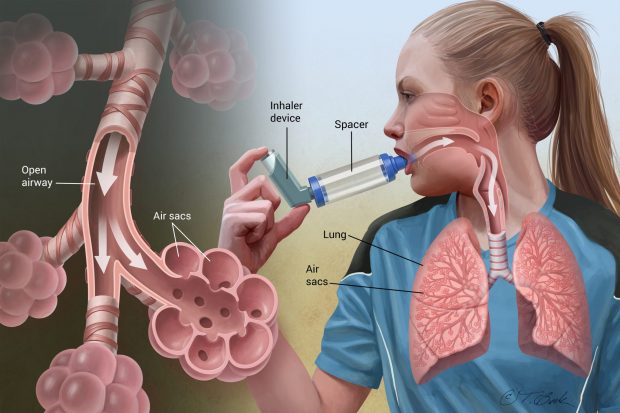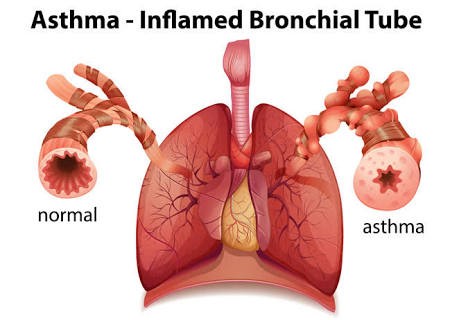Asthma is a chronic respiratory disorder. In asthma, the airways of the lungs get inflamed. Due to this inflammation, there is swelling inside the airways. This also causes excess production of mucous. The combined effect of swelling and mucous production is that the passage of air gets obstructed. This makes breathing difficult. A whistling sound or wheezing is often heard in such patients. Often the patient gets cough due to this obstruction of the airways. This cough is a reflex of the body to get rid of the excess mucous in the airways. A sense of tightness or heaviness is felt in the chest. One cannot expand the chest fully while inhaling.

Asthma – CAUSES
According to the etiology, bronchial asthma is divided in the following groups:
1. Allergic (extrinsic/ atopic) Asthma – This type of asthma usually starts in childhood and is often preceded by eczema. But most of the young adults (<35 yrs) developing asthma also fall in this category. Genetic factors also play a significant role i this. In this type of asthma the allergen leads to production of excessive (IgE) immunoglobulins.
2. Infective or Intrinsic Asthma – This is not hereditary or allergic, but may be caused by, or at least associated with upper respiratory tract or bronchial infection which is usually viral.
3. Emotional Asthma – Psychological factors (like anxiety, emotional stress etc) are often considered to be the sole cause of some asthmatic attacks, but it is still not certain whether it can be the sole cause or is only a precipitating factor.
4. Occupational asthma – This can occur in certain industries in which there is exposure to metallic dusts (esp. platinum salts), biological detergents, toluene diisocyanate, polyurethane, flour and dust from grains etc.
What ever may be the cause, it ultimately leads to paroxysms of bronchial obstruction produced by widespread bronchial spasm accentuated by plugging of the bronchi with excessive mucus.

Asthma Triggers
The major triggers for asthma include:
Poor or polluted air,
Tobacco smoke, well
Emotional stress,
Cold air,
Exercise,
Upper respiratory tract infections (head colds and sore throats)
Exposure to things that provoke an allergic response.
Asthma – SIGNS AND SYMPTOMS
Recurrent episode of paroxysmal dyspnoea (difficulty in breathing)
The breathing is laboured, with a wheezing sound, mainly on expiration.
Asthma attacks often occur in the early hours of morning (when there is no immediate precipitating cause).
During the attack patients often prefers to sit then lie down.
Asthma – HOW DIAGNOSIS IS DONE?
Diagnosis can usually be made clinically by a competent doctor. Allergen sensitivity tests, X-ray, spirometry, sputum and blood tests etc may be of use in finding the cause and severity of the condition.
Asthma – WHAT TO DIFFERENTIATE FROM?
Bronchitis
Cardiac asthma
Renal asthma
Isolated attacks of non-paroxysmal dyspnoea.
Asthma – COMPLICATIONS
Apart from chronicity, usually no complications.
Pneumothorax, emphysema, or areas of consolidation or pulmonary collapse may occur in very advanced cases.
Bronchial Asthma Healing Diet
Avoid exposure to allergens.
Avoid food with artificial colour, or chemicals.
Wash your fruits and vegetables with hydrogen peroxide.
Avoid foods rich in saturated fats.
Follow a gluten-free diet.
Eat plenty of leafy, dark green vegetables, legumes, whole grains, and seeds.
Avoid mucus-forming foods.
Drink plenty of fluids to keep secretions loose.
If you smoke, don’t smoke. Avoid second hand smoking.
Side-Effects of Conventional Treatments
Inhaled bronchodilator have very less side effects as compared to tablet or liquid anti inflammatory as they causes….
Mood swings or depression, especially in children,
Increased appetite and weight gain,
Fattened, ‘moon’ face,
Thinning of the skin,
Restlessness and hyperactivity,
Sleep disturbances,
Heartburn and indigestion,
Easy bruising,
Worsening or triggering of diabetes,
Osteoporosis (brittle bones),
Cataracts of the eyes,
Muscle weakness,
Reduced resistance to infection,
High blood pressure,
Impaired growth in children.
The good news is that by treating your asthma with homoeopathy all of the above side-effects can be avoided and your asthma symptoms are far more likely to reduce over time and clear completely.

Homoeopathy approach
Homeopathy is a system of medicine which tries to ‘cure’ this disease, instead of trying to provide symptomatic relief. While dealing with a case of asthma, a homeopath not only records the symptoms of the disease but also studies the medical history, family history, physical and psychological characteristics of a person. This helps to find the cause, the precipitating factors, and the hereditary tendency etc.
Remedies like ars.alb,nat.sulf ,spongia , ipecac,kali.bich,blatta orientalis ,lobelia ,antim.tart ,tuberculinum, etc are being used frequently and gives miraculous results.
Homeopathy can cure asthma. How long it will take to completely cure the disease would, however, vary from case to case. Factors such as duration, severity and individual response to Homeopathic medicines decide the course and length of treatment.




